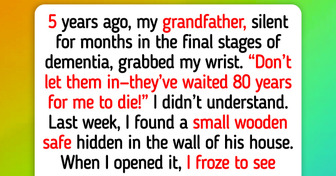I'm "Abandoning" My Best Friend, She's Ruining My Life
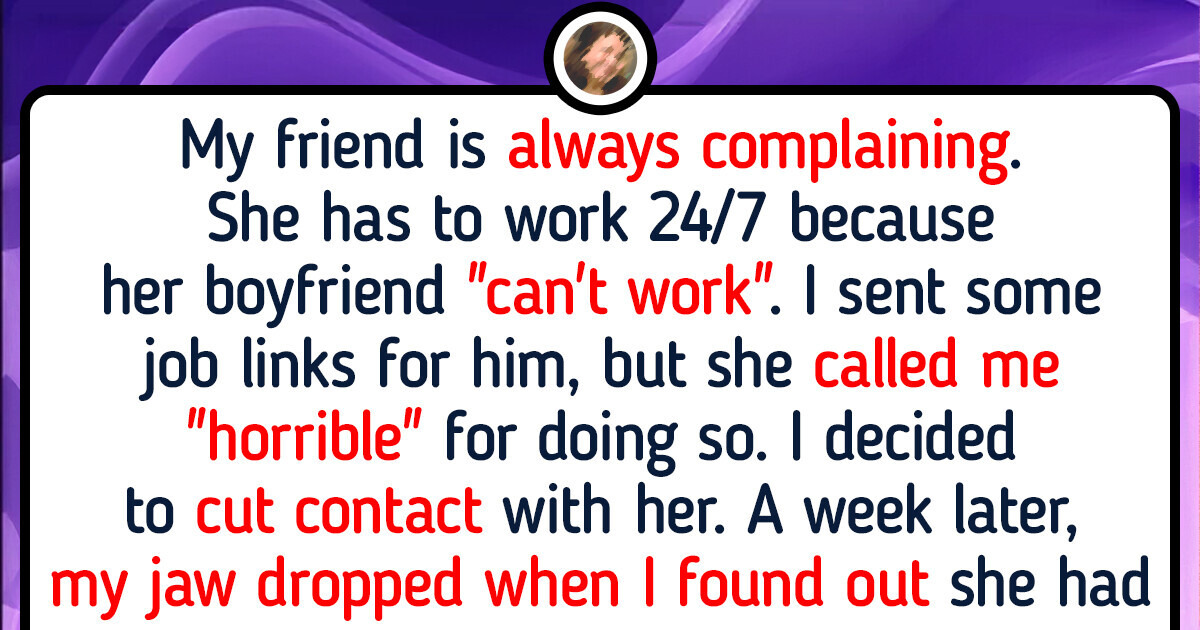
Friendships are supposed to be about mutual support and understanding, but what happens when they start draining you emotionally? I never imagined I’d have to walk away from my best friend of years, but I had to make the difficult choice to protect my mental health and prioritize self-care. Here’s my tragic story.
The friendship that turned toxic.
“Hi, Bright Side readers! I’m Josh, and I’d like to get this off my chest. I don’t know whether what I did was right or wrong, but it felt right at that moment. However, now, I’m not so sure.
My friend Rachel is always complaining about life. She has to work 24/7 to keep a roof over her head because her boyfriend of seven years has anxiety and ’can’t work.’ While I sympathized with her situation, it was exhausting to hear about it constantly without any signs of improvement.”
Josh further adds, “Trying to help, I sent her some job links for him that were perfect for someone dealing with anxiety, hoping her boyfriend could find something manageable and lighten her load. But instead of appreciating the gesture, Rachel told our mutual friends I was ‘trying to make her boyfriend get a job’ and called me ‘horrible’ for doing so.”
“This wasn’t the first time I felt like my efforts to support her were met with hostility. Any time I tried to talk about my own life and relationship, Rachel would hijack the conversation, steering it back to her endless saga of misery.”
The moment I reached my breaking point.
“The final straw came when I landed a new job, the one I’ve always dreamt of. I couldn’t wait to share the happy news with my best friend. But before I could even finish my sentence, Rachel cut me off with something that completely shocked me, ‘I can’t believe you’re talking about a dream job when I’m stuck in a dead-end job that I can’t quit.’
At that moment, I realized how one-sided our friendship had become. Her constant negativity and inability to support me in return were taking a toll on my emotional well-being. I decided to cut contact with her to protect my mental health.”
The betrayal I never saw coming.
“A week later, my jaw dropped when I found out she had gone behind my back. Rachel had been spreading lies to our mutual friends, painting me as a villain who ‘abandoned her in her darkest hour.’ She twisted my actions, claiming that I was jealous of her relationship and wanted to meddle in their lives.
She even told people I was trying to make her boyfriend owe me a favor by forcing him to get a job. To make matters worse, she shared personal secrets I had confided in her, twisting them to make me look bad and complicating things between me and my girlfriend.
I trusted Rachel for years, and in the end, she betrayed me. That hurt deeply, but it also helped me finally walk away from her. Maybe some friendships are just too toxic to salvage, no matter how much history you share.
It wasn’t easy, but I chose myself. I set boundaries and refused to let her manipulation and negativity dictate my life any longer. Walking away allowed me to focus on my mental health and prioritize relationships that bring me joy and support.
She’s been apologizing to me and trying to reach me since. Should I give her another chance? Or at least listen to what she has to say?”
Thank you, Josh, for sharing your personal story. One-sided friendships can be hard, and you don’t have to feel guilty for choosing your mental peace. Here are some suggestions from us that might help you navigate the situation ahead:
- Assess her apology: Think about whether Rachel’s apology feels genuine. Does she take responsibility for her actions, or does it seem like she’s making excuses? If it doesn’t feel honest, you’re not obligated to respond or forgive her.
- Decide on boundaries: If you choose to respond, be clear about what you’re comfortable with. Let her know what’s acceptable in your interactions moving forward.
- Communicate on your terms: Respond through text or email if you’re not ready for a phone call or face-to-face meeting. This lets you control the conversation and take time to process her words.
- Take things at your pace: If you’re open to reconnecting, start small. Keep conversations light and observe whether she’s making real changes in her behavior. If reconnecting feels harmful or stressful, it’s okay to let go. You can acknowledge her apology without resuming the friendship.
A woman previously wrote to us, explaining why she stopped supporting her retired mom, wondering if her actions were justified. Check out her letter here.
Comments
She is a horrible person please stay away!! I had "friends" like this then realized my enemies treated me better than my own friends....
Interesting I just saw this article because I’m having a mental trepidation about a long time friend who also hijacks the conversation and makes it all about her. I’ve tried to overlook it and just put it aside but the last straw was texting her to tell her my very dear friend had died who I talked about over the yrs with her. She didn’t even acknowledge my text until 5 days later and still didn’t mention anything about his death, it was again, about her.
So I really doubt people like this guy’s friend nor mine will change. I’m not mad or anything at this point, I just feel the need to put her out of my life without hurting her or causing any animosity. Just not sure how to do it, but hopefully this guy can get the negativity out of his life without feeling guilty, I think he will be better off, because I honestly think people like this use others as their spring board because we probably have been the main ones who let them. Other’s would have ran long ago.
I absolutely think you should hear her out. It probably won't change anything, but you know what they say... "know thy enemy" and who knows? Maybe something will change. It could happen. I don't know if you are in the US but severe anxiety (diagnosed and treated) is grounds for receiving SSI (I assume since he hasn't been working he won't have enough credits for SSDI). It's only 9 hundred and something dollars but it's better than nothing. Maybe suggest it. Then if you feel like you've done all you can you can walk away guilt free.
Related Reads
My MIL Forbade Me From Coming to Thanksgiving - There Was Heinous Plot Behind It
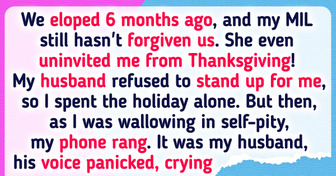
14 People Who Uncovered the Disturbing True Face of Their Friend
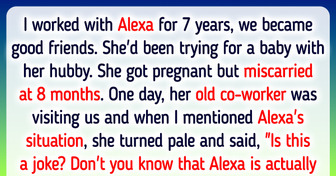
I Heard a Secret Conversation Between My Husband and His Work Buddy — I’ve Never Been This Humiliated
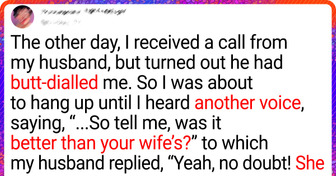
I Argued With My MIL Over a Trifle and Ended Up Uncovering a Dirty Family Secret
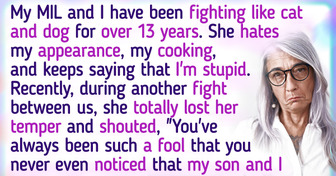
I Refused to Share a Secret Family Recipe With My Boyfriend’s Mom
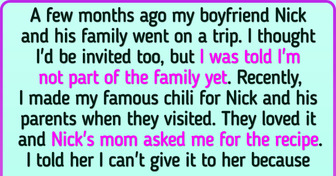
I Refused to Share My $400K Lottery Winnings With My Family
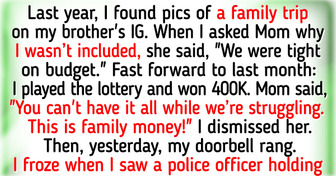
I Didn’t Want My Ex’s Wife at My Son’s Graduation — The Result Was Devastating
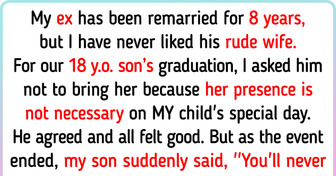
16 Stories About Family Members Who Had a Few Skeletons in the Closet
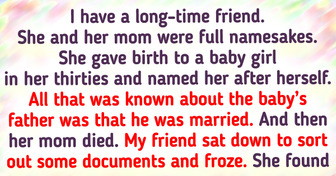
I Fell in Love With a Man I Didn’t Know Was Married, Now I Want to Ruin His Family

My Cousin Uninvited Me to Save Money—My Petty Revenge Was Absolutely Worth It

19 Stories That Prove Money Is the Ultimate Truth Serum for Relationships

14 Real Moments When Empathy Changed Everything Forever
